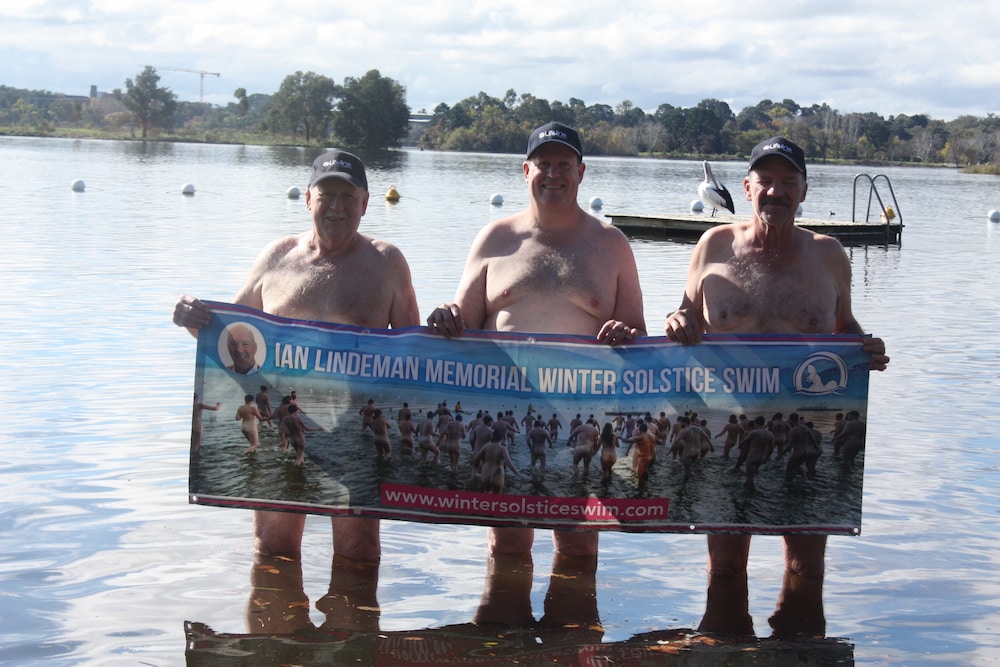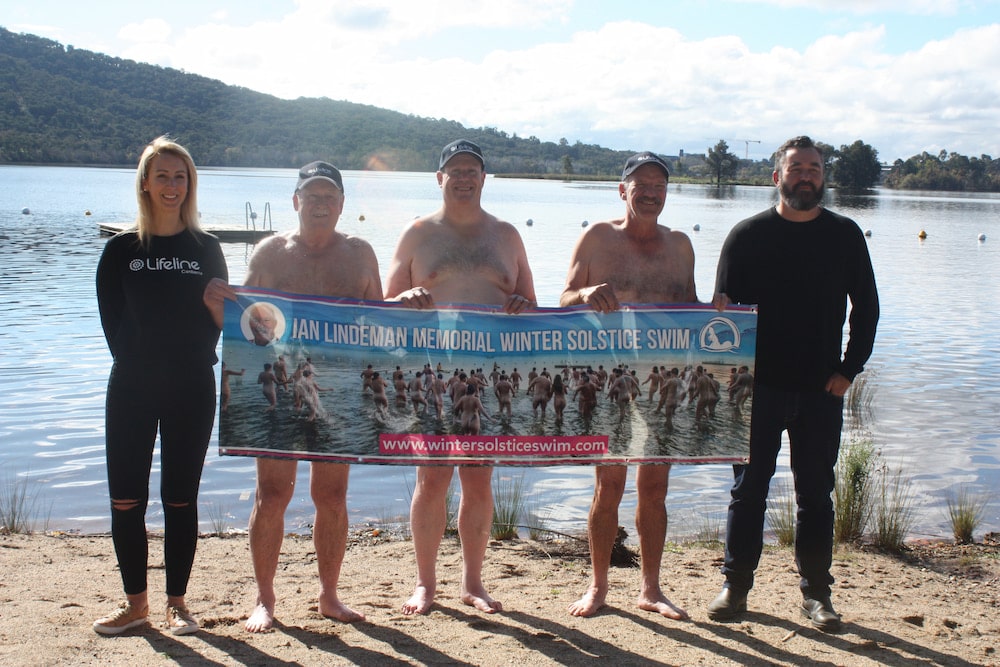David Windeyer and two friends waded into Lake Burley Griffin to launch the sixth Ian Lindeman Winter Solstice Nude Charity Swim on a sunny May afternoon, 20 degrees warm – but it will be around 2 degrees on a dark June morning when they, and hundreds of other hardy Canberrans, brave the waters in the buff.
The event is a fundraiser for Lifeline Canberra, which has seen a staggering 700 per cent increase in calls to its 24/7 crisis hotline since April 2021.
The Winter Solstice Swim raised $40,000 for Lifeline last year, and organisers have set a target of $50,000 for 2022.
“They need more money, and there couldn’t be a more worthy cause to support,” said Ben Johnston, the Swim’s chairperson. “It’s been a couple of long years for them with all the demands on their services through COVID – it’s unprecedented.”
Read more:
- Winter Solstice Nude Charity Swim attracts record numbers
- Go jump in the Lake: Streakers swim on the solstice
- Winter Solstice swim to run cheek-to-cheek in 2020
Before the pandemic, Lifeline received 2,500 calls a day; since the pandemic began, the charity has not seen fewer than 3,500 calls a day.
“And there’s no sign of that diminishing,” CEO Carrie-Ann Leeson said.
“That increase has sustained, despite mandates being removed, people getting on with their lives, the skies opening, flights up in the air, people being able to travel, return-to-work, have more engagement with one another face-to-face.
“We haven’t seen the level of distress diminish, when the restrictions reduced.”
What is most distressing, she feels, is that of the increase in calls to Lifeline nationally, many more of those are from Canberrans.
“It’s startling. It tells us that the after-effects of this pandemic – the hangover, if you like – is going to continue to be an issue and a burden on individuals and the system for many years to come.”
In fact, Ms Leeson said, it might take up to four years for most people to start to feel at ease again.
Before the pandemic, the number one reason for a Canberran to call the crisis hotline was a relationship breakdown; now, the most themes are financial distress, isolation, and self.
“Individuals really struggling within themselves, within their relationships, within their immediate contacts, and then struggling financially at the same time,” Ms Leeson said.
Reaching out, getting clinical supervision, re-engaging with the community will be “a big ask” of individuals if they want to try to feel better, she suspects.
The first steps, she said, are self-awareness (understanding what effect the pandemic had on us individually) and self-compassion (being kind to ourselves and knowing that it’s OK not to feel OK).
But Lifeline is here to help the community. In the ACT alone, it has 800 volunteers, half of them trained crisis supporters.
“How they’ve coped has been a real demonstration of the human spirit,” Ms Leeson said. “Not only have they been living in a Lifeline call themselves, because they’ve been in crisis along with everyone else in the community; they had to double down, dig deep and come into the crisis support centre, and they’ve done that willingly.”
The late Ian Lindeman, a local at Mr Johnston’s Old Canberra Inn, started the Swim to raise funds and awareness for mental health and cancer research. Since Mr Lindeman’s death in 2019, the Swim has been held in his honour, keeping his legacy alive.
Each year, more people take part: 270 braved the waters last year, up from 170 in 2019, the last pre-pandemic swim.
“We’re hoping to do better again this year,” Mr Johnston said. “It really is an unforgettable experience; everyone who does it really is transformed, and keeps coming back for more.”

A cold dip on a winter morning might seem unpleasantly spartan: the outside temperature is minus-2 degrees, but the water itself is a “balmy” 11 or 12 degrees. You might think you’d have to be “barmy” to jump in the lake, but those who take part swear by its health benefits, particularly on the winter solstice.
“It’s an opportunity for people to wash away the negative energy for the new solar year,” Mr Johnston said. “That’s why you strip back to naked. So you just go in and then you come back refreshed.”
“It’s great just to celebrate the middle of winter, and have the refreshing swim,” said David Windeyer.
“I’d encourage people to come and give it a go. It can sound scary at first, but for newcomers, once you’re on the beach with everyone doing exactly the same thing, there’s nothing to worry about.”
“People can be a bit squeamish about the nudity,” Mr Johnston said. “But no-one really notices it in the flurry of activity on the morning itself.”
There will be plenty of fires, hot coffee, and a free sausage sizzle. And a naked bagpiper to pipe the bathers into the water.
“It’s a sense of adventure with the bagpipes playing, which used to call the troops into army and into war,” Mr Johnston said. “It does feel fitting that people are going in to battle the elements in the lake. But in actual fact, the number of smiles on everyone’s faces just shows that it’s actually quite a joy-filled experience.”
As a ‘larger person’, Mr Windeyer said the Swim helps him with body acceptance. “When you’re in the middle of everyone and you look around, you get all different shapes and sizes; there’s no normal or abnormal.”
Nor is there any danger of Peeping Toms. “There’s a no spectator policy,” Mr Johnston explained. “We don’t have anybody coming along just for fun watching. It’s participants only and a few volunteers, and in a discreet location.”
Registrations for the swim are now open; all registrations are $35, and go directly to Lifeline. Those who prefer to stay warm, dry, and clad can still support the Swim by donating to www.wintersolsticeswim.com. 100 per cent of donations go to Lifeline.



